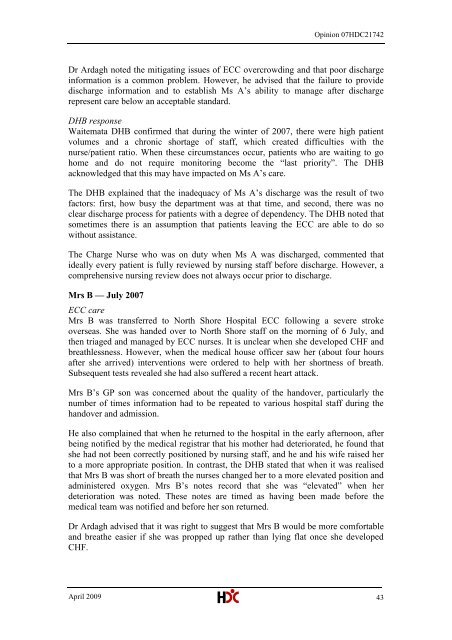North Shore Hospital report - New Zealand Doctor
North Shore Hospital report - New Zealand Doctor
North Shore Hospital report - New Zealand Doctor
You also want an ePaper? Increase the reach of your titles
YUMPU automatically turns print PDFs into web optimized ePapers that Google loves.
Opinion 07HDC21742Dr Ardagh noted the mitigating issues of ECC overcrowding and that poor dischargeinformation is a common problem. However, he advised that the failure to providedischarge information and to establish Ms A‘s ability to manage after dischargerepresent care below an acceptable standard.DHB responseWaitemata DHB confirmed that during the winter of 2007, there were high patientvolumes and a chronic shortage of staff, which created difficulties with thenurse/patient ratio. When these circumstances occur, patients who are waiting to gohome and do not require monitoring become the ―last priority‖. The DHBacknowledged that this may have impacted on Ms A‘s care.The DHB explained that the inadequacy of Ms A‘s discharge was the result of twofactors: first, how busy the department was at that time, and second, there was noclear discharge process for patients with a degree of dependency. The DHB noted thatsometimes there is an assumption that patients leaving the ECC are able to do sowithout assistance.The Charge Nurse who was on duty when Ms A was discharged, commented thatideally every patient is fully reviewed by nursing staff before discharge. However, acomprehensive nursing review does not always occur prior to discharge.Mrs B — July 2007ECC careMrs B was transferred to <strong>North</strong> <strong>Shore</strong> <strong>Hospital</strong> ECC following a severe strokeoverseas. She was handed over to <strong>North</strong> <strong>Shore</strong> staff on the morning of 6 July, andthen triaged and managed by ECC nurses. It is unclear when she developed CHF andbreathlessness. However, when the medical house officer saw her (about four hoursafter she arrived) interventions were ordered to help with her shortness of breath.Subsequent tests revealed she had also suffered a recent heart attack.Mrs B‘s GP son was concerned about the quality of the handover, particularly thenumber of times information had to be repeated to various hospital staff during thehandover and admission.He also complained that when he returned to the hospital in the early afternoon, afterbeing notified by the medical registrar that his mother had deteriorated, he found thatshe had not been correctly positioned by nursing staff, and he and his wife raised herto a more appropriate position. In contrast, the DHB stated that when it was realisedthat Mrs B was short of breath the nurses changed her to a more elevated position andadministered oxygen. Mrs B‘s notes record that she was ―elevated‖ when herdeterioration was noted. These notes are timed as having been made before themedical team was notified and before her son returned.Dr Ardagh advised that it was right to suggest that Mrs B would be more comfortableand breathe easier if she was propped up rather than lying flat once she developedCHF.April 2009 43
















